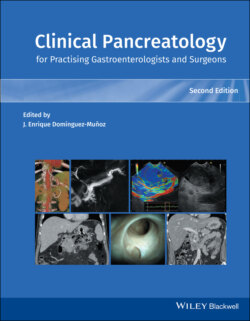Читать книгу Clinical Pancreatology for Practising Gastroenterologists and Surgeons - Группа авторов - Страница 22
Prophylactic Antibiotics
ОглавлениеThe basis for administration of prophylactic antibiotics in patients with AP is to prevent infection in those who develop necrotizing AP. The mortality in patients with necrosis is up to 20% compared with 5% mortality in those with edematous or interstitial AP [68]. Once infection complicates necrosis, mortality increases to 30–40%. Therefore, prophylactic antibiotics would appear to be a reasonable therapeutic approach. However, it has been shown to be ineffective in a Cochrane Database systematic review by Villatoro et al. [69], who found that there was no benefit to antibiotics for preventing pancreatic necrosis infection or decreasing mortality.
Subgroup analysis of patients who received imipenem showed a significant decrease in pancreatic infection, but no significant reduction in mortality. Antibiotics should only be administered to patients early in the course of AP who have suspected biliary sepsis or show evidence of extrapancreatic infection (i.e. urinary tract infection and/or positive blood cultures). In addition, antibiotic treatment should be used for suspected or diagnosed pancreatic or peripancreatic infections in the later phase (one to two weeks) after onset of disease. The role of antibiotics in this phase is to allow the organization of the necrosis as well as delaying surgery, usually until four weeks, as this is associated with decreased mortality compared with early intervention. In addition, delay and use of antibiotics may allow for application of less invasive drainage procedures. In addition, antibiotic therapy alone can effectively treat a subgroup of patients with infected necrosis [70,71]. An initial report by Runzi et al. [71] of nonsurgical treatment of 16 patients with severe AP with infected pancreatic necrosis (IPN), treated only with an antibiotic regimen adapted to bacteriology and nonsurgical therapy, reported a 12% (2 of 16 patients) mortality rate. Six recovered without further complications and 10 patients developed single or multiple organ failure. This study placed a wedge in the concept that all patients with IPN needed immediate open pancreatic surgical drainage. The currently accepted management of patients with IPN is that early in their course they can generally be managed nonsurgically with antibiotics in the initial stage and that antibiotics alone can also be definitive therapy. The second concept is that surgery can be delayed, which allows the operative intervention to be performed electively and less invasively.
